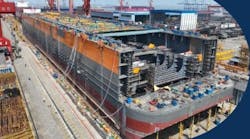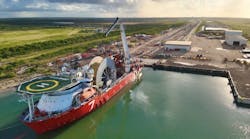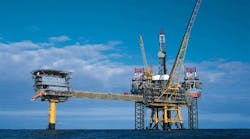Offshore staff
LONDON – Investment in UK offshore fields is currently being sustained by some very large projects. However, the longer-term outlook is not so bright, according to Oil & Gas UK’s 2012 Activity Survey.
CEO Malcolm Webb pointed out that the new developments were commercially committed before the unexpected petroleum tax rises announced last March. “However, 2011 production saw a record drop, exploration halved and business confidence remained sluggish, despite an average oil price of $111 per barrel.”
The survey found that UK oil and gas production fell by 18% last year to 1.8 MMboe/d, due to a combination of unplanned stoppages at producing fields and the sector’s lowest-ever volumes of new production coming onstream.
Although production in 2012 should rise slightly to 1.85 MMboe/d, the overall picture for the next five years remains depressed.
Webb explained: “The drop in 2011 production illustrates some of the economic challenges we face in this mature oil and gas province – rising costs and the need to inject more capital to sustain the existing production base.
“Although headline investment has tripled over the last decade, the amount of oil and gas recovered per pound (£) invested has fallen by two thirds over the same period. This effectively leaves us fighting hard to stand still. Current and planned UK investment must be seen in light of this acute decline in capital efficiency and viewed in a global context – the UK attracts less than 4% of global oil investment.”
Nevertheless, last year’s total investment of £8.5 billion ($13.47 billion) to bring new reserves into production was at the top end of Oil & Gas UK’s expectations in light of the Budget changes.
Aside from the new large projects, the main driver was the substantial capex needed for maintenance to prolong the life of aging assets. These factors will continue to drive capex in 2012, forecast to reach £11.5 billion ($18.2 billion).
The survey shows that although up to 24 Bboe could still be extracted from UK fields, current plans will likely lead to only around 10 Bboe being developed. And only 15 exploration wells were drilled last year on the UK shelf, the lowest annual total in the sector’s history.
To increase activity, the association calls for stabilization of the UK’s fiscal regime, with clarity over tax relief on decommissioning costs and extension of the field allowance structure to promote further field developments. These measures could yield an additional 3 Bboe of production.
Jason Lovell, partner at law firm Everhseds, said of the survey: “Following last year’s unexpected increase in the tax burden of oil and gas companies, it is clear that the industry has justifiable reasons for feeling it is now entitled to a break. They are not alone in this belief as the move, which increased the marginal tax rate on certain fields to 81%, subsequently received wide spread negative comment both within the industry and from [Britain’s] Energy and Climate Select Committee.
"The move was also linked to the shutdown or slowdown of production from several fields. This was all in the context of an industry which already (directly and indirectly) is estimated to provide around 440,000 jobs within the UK and in 2010/11 contributed approximately 20% of the total corporation tax revenues received by the Chancellor.
"There is also a certain amount of give and take here. If the Chancellor can offer sufficient tax breaks to boost output by an estimated 3 Bboe, that output will generate a huge amount of future tax revenue for the government – which will far outweigh the £2 billion [$3.17 billion] tax grab of last year."
2/28/2012




